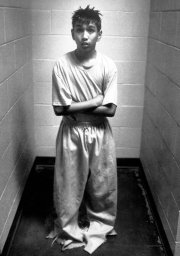- Details
- Written by Sarah C. Corriher Sarah C. Corriher
- Category: Political Articles Political Articles
- Published: May 29, 2009 May 29, 2009
Those who have been reading this site for an extended period of time will know my views on the sentencing of young offenders. I am going to reiterate that here, because there is a new bill which has entered the U.S. House of Representatives which would provide second chances to children who were sentenced with "life without parole" (meaning no possibility of eventual release -- ever), or a regular "life sentence", which is about 20 years. H.R. 2289, Juvenile Justice Accountability and Improvement Act of 2009 would provide hope to the many young people who currently have none.
 Christopher Pittman:
Christopher Pittman:Sentenced To 30 Years
It is believed that there are over 2,500 youth offenders serving a "life without parole" sentence in the United States today. This is not imposed on children anywhere else in the world, except here in the United States; where the Bill of Rights is supposed to forbid all "cruel and unusual punishments".
The Supreme Court previously recognized (Roper vs. Simmons) that there are "known differences" between the maturity and understanding of youths over adults; and because youths have much greater chances of corrigibility, the United States would not allow the execution of children. All the same, are there really huge differences between locking a child away until death, and executing him? Imagine kneeling down to a 12-year-old and telling him that he is never going to get out of prison, or that he might get that chance in 30 years, like in the case of Christopher Pittman. Let's be honest: if they release Chris at the age of 42 after having been sentenced at age 12, then he will have absolutely no chance of surviving as a free man once he is released. His life will be completely thrown away. In these cases, a judge abominably acted to unleash the harshest of vengeance against a child, whereby true justice and rehabilitation were never considered.
There are many children in this country who are living their lives behind bars, with an inherent lack of understanding of their sentences. In many cases, they simply cannot understand, nor accept, that they may never be released. In the most disturbing of instances, children have been locked away for simply being with an offender who committed a crime, without actually playing an active role. Even if children were capable of making the same adult decisions, with the same degree of guilt, it is still a fact that children are given no choices about who their companion guardians are, so even more egregious is the fact that they are so often convicted based only on guilt by association. Furthermore, in contrast with the society's assumptions about these children; many of these kids were thrown away in prison for crimes much less severe than murder.
Which 3rd World nation am I describing here? Oh yeah, I forgot it is the U.S.A., the same "civilized" country that is on Amnesty International's watch lists.
The life without parole sentence assumes that the offender is beyond all rehabilitative efforts, and this remains true even into adulthood. These youthful criminals are judged to be so bad that it is supposedly unreasonable for the judge to believe that they could ever change. In other words, this process normally involves discarding the Constitution and the rule of law in favor of satisfying a judge's egotistical desire for pay-back. It has become society's way of discarding unwanted children. These children are given no education, psychological evaluations, counseling, or any of the programs which are designed to allow later integration into society. This is because it is assumed that they will never re-enter society; so the needs of these children will never be met, despite the fact that we would go to prison ourselves if we ever treated a child in this fashion.
All of this may soon change. Under this bill, those who were sentenced for committing an offense before they reached 18 will be given a second chance within their first 15 years of incarceration.
Excerpts from the bill read:
(d)(1). Each state shall have in effect laws and policies under which each child offender who is serving a life sentence receives, not less than once during the first 15 years of incarceration, and not less than once every 3 years of incarceration thereafter, a meaningful opportunity for parole or other form of supervised release.6(a). The Attorney General shall, subject to the availability of appropriations, award grants to States to improve the quality of legal representation of certain child defendants and child offenders by providing for competent legal representation.
 Condemned To Die In Prison
Condemned To Die In Prison
The latter argument exposes something which is becoming more well-known in recent years. State-appointed lawyers do not do their jobs well, and rarely try. They are awful; mostly because there are not enough of them. Inmates call it "buying justice" whenever someone manages to pay for a good lawyer. When there is enough publicity on a particular case, some lawyers offer to work for free. It is both a good publicity stunt, and in rare cases, they actually believe in the innocence of the offender, or the misapplication of the law enough to motivate them to work for free.
The Supreme Court has also said this month, that it will debate the constitutionality of life without parole for juveniles. Hopefully, it will make a similar ruling to the one that it made in regard to the execution of young offenders. The Justices should understand that young people are more susceptible to other influences, are far more immature, often lack understanding, are more prone to lack the ability to physically leave a criminal situation, and they have an extraordinary chance for rehabilitation.
